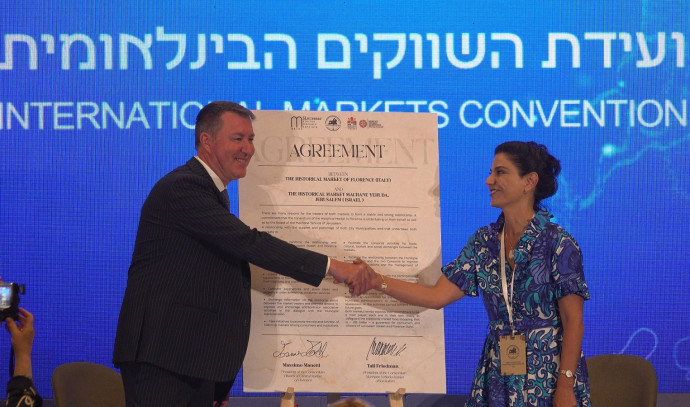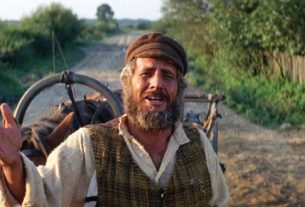Colloquially known in Hebrew as the “shuk”, the Mahaneh Yehuda open-air market in Jerusalem, known as one of the country’s most striking bazaars, just celebrated its centennial.
Festivities included concerts with famous Israeli bands, local contests between food vendors, and more. “People from all over Israel came, as well as a ton of tourists. It was amazing,” Yehudit Yechezkel, owner of a local restaurant, told The Media Line.
Mahaneh Yehuda is also one of Israel’s oldest markets and an icon of Jerusalemite culture. It boasts everything from a bustling neighborhood community to over 250 stores and stalls filled with art and fashion, home goods, fresh produce, and high-end restaurants. It draws millions of visitors each year. The market has evolved from a few stalls one hundred years ago to the city’s unique and massive heartbeat. Some are concerned with the market’s identity shift.
Individual vendors first began selling their wares here in the Ottoman period, when peasants would come to this location outside the walled city to sell their produce.
It wasn’t until the British Mandate, however, that locals developed infrastructure such as permanent stalls, storage facilities, and drainage ditches. As a result, most experts date the market’s formal establishment to 1923.
Moshe Lion, Jerusalem’s mayor, says that there didn’t use to be many local stores. As a result, Jerusalemites bought their fruit and vegetables in the shuk.
“It all started with older women who came to sell their produce from Ein Rafa,” a Palestinian village outside of Jerusalem, Tali Friedman, head of the shuk’s traders committee, told The Media Line. “They stopped here on their way to the Old City,” creating “this amazing neighborhood and market” by accident.
Yechezkel said she has been working in the market for nearly 36 years. “When I started, the character was completely different,” she recalled. “There were barely any restaurants, and most stalls were just fruits and vegetables.” Residents went “through a lot,” including the Palestinian uprisings, or Intifadas, and wars. Somehow, she said, “We survived.”
Retired shop owner Hanukkah Zion, another long-time shuk resident, said he was a shoe salesman in the market for 81 years. Speaking to The Media Line on Etz Haim (Tree of Life) Street, one of the market’s main thoroughfares, Zion recalls, “Here in Mahaneh Yehuda, some 50 years ago, there were two bombings. One here on this street, and then another” on the nearby Agripas Street.
History of attacks on the shuk
A car bombing in the market on November 22, 1968, killed 12 people and injured more than 50. It was at the time largest terrorist attack on Israelis since the 1948 War of Independence.
On July 30, 1997, two suicide bombers detonated explosives in the market, killing 16 people and injuring 178. The armed Palestinian group Hamas claimed responsibility. In the aftermath, Israel imposed strict closures on the West Bank and Gaza Strip, froze political negotiations with the Palestinians, and attempted to kill Hamas leader Khaled Mishal in Amman—a move that severely strained Israel’s relations with Jordan.
During the Second Intifada, on March 29, 2002, a 17-year-old girl detonated a suicide bomb in the market, killing herself and six others, and injuring 104. Al-Aqsa Martyrs’ Brigades claimed responsibility. As a result of the bombing, a meeting planned between US Secretary of State Colin Powell and Palestinian Authority President Yasser Arafat was canceled.
In addition to these incidents, Mahaneh Yehuda Market has been the target of several smaller attacks, including bombings in 1994 that killed two, and in 2001 that killed one. Each attack further strained the already tense relationship between Israel and the Palestinians, and the Israeli government often responded with enhanced security measures and sometimes retaliation against the suspected perpetrators.
With beefed-up security and a decline in Palestinian suicide bombings, the major challenge today is retaining the market’s unique traditions and identity in the face of modernization, inflation, and corporate globalization.
It’s a challenge shared by open-air markets around the world, several of which sent representatives to Israel this week to participate in the first International Markets Conference, which was held in Jerusalem on July 3.
Attendees included the heads of historic markets such as Le Botteghe in Florence; Borough Market in London; Boqueria Market in Barcelona; Markthalle Neun in Berlin, and Central de Abasto in Mexico City. Market heads from additional countries, including Thailand, Georgia, and Japan, also participated.
Jerusalem Mayor Moshe Lion, who also attended the conference, told The Media Line that the shuk had evolved over the last decade into an entertainment district with “good restaurants and bars [alongside] the traditional market.” As mayor, he says, his goal is to “maintain a mix between the traditional shuk and the bars” so that they “continue to exist side by side, and not one at the expense of the other.”
A highlight of the conference was the signing of a cooperative agreement between Mahaneh Yehuda and the historic market in Florence, Italy. The agreement, called a “Matching Markets Deal,” provides a framework for the two markets to help each other balance the traditional with the new, and is intended to be just the first of many such agreements between markets.
The Israeli-Italian collaboration emerged during the pandemic, when Massimo Manetti, a leader in Florence’s market, shared knowledge with Mahaneh Yehuda’s Friedman on weathering the repeated COVID-19 lockdowns.
“Today we proposed creating a global union of historic markets around the world,” Manetti told The Media Line. The goal is to create “an association to meet, talk and figure out how to improve our markets. We would like it if UNESCO recognized us since it protects the traditions and cultures of the world.”
Friedman says that traditional market leaders should trade “knowledge and be there for one another, and for other markets around the world.” Sitting down with other market heads, she realized that “we are all facing the same issues.” The agreement, she says, “is about shared ideas and stories.”


